|
|
|
Sort Order |
|
|
|
Items / Page
|
|
|
|
|
|
|
| Srl | Item |
| 1 |
ID:
142225
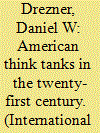

|
|
|
|
|
| Summary/Abstract |
Think tanks have been a part of the United States’ foreign policy establishment for more than a century. They have played a significant role at key junctures in US foreign policy. Two inflection points, however, have dramatically altered the think tank landscape in the last 15 years. The 11 September 2001 terrorist attacks caused these organizations to dramatically expand their staff and overhead, as the demand for their services increased. The 2008 financial crisis subsequently left many of these same think tanks financially overextended. This circumstance forced these organizations to seek out more unconventional funding arrangements, imposing new constraints at the exact moment that their competitive environment intensified. In the twenty-first century, US foreign policy think tanks will maintain their relevancy by moving beyond what made them relevant in the last century.
|
|
|
|
|
|
|
|
|
|
|
|
|
|
|
|
| 2 |
ID:
165206
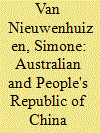

|
|
|
|
|
| Summary/Abstract |
Through qualitative comparative analysis of policy documents and official statements over the last 10 years (2008–2018), this paper examines Australian and PRC government conceptions of the international order and the associated policy implications. Their understandings of the international order are informed by their self-defined national role conceptions and perceptions of other states, and are manifested in discussions of institutional reform, international law and human rights. Australia's self-conception as a middle power informs its emphasis on maintenance and US leadership of the existing order, while the PRC's self-conceptions as both a developing and established power enable it to frame itself as either an upholder or reformer of the order. Both governments highlight the ‘rules-based’ mechanisms of the WTO, and are more likely to agree on trade and economic issues than on other matters. Their responses to the 2016 South China Sea arbitration tribunal decision and discussions of the role of human rights in the international order suggest less agreement is likely on international law and human rights norms. While Australia considers the PRC a potential challenger to the existing order, Australia does not feature in PRC discussions of international order, suggesting its limited ability to affect PRC foreign policy decisions.
|
|
|
|
|
|
|
|
|
|
|
|
|
|
|
|
| 3 |
ID:
152972
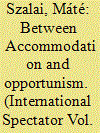

|
|
|
|
|
| Summary/Abstract |
Smaller members of the Gulf Cooperation Council defied theoretical and practical expectations as they were able to enlarge their international influence during the years of the Arab Spring. They adopted markedly different foreign policy strategies, which can be seen as stances lying between accommodation and opportunism, depending on the extent to which they respected the security concerns of their geopolitical patron, Saudi Arabia. The mainstream schools of IR theory – neorealism, neoliberalism and constructivism – offer different explanations for these phenomena. Although none of the three schools can provide a completely exhaustive explanation, neoliberalism seems to offer the most comprehensive framework for analysis.
|
|
|
|
|
|
|
|
|
|
|
|
|
|
|
|
| 4 |
ID:
149800
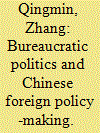

|
|
|
|
|
| Summary/Abstract |
This article tries to bridge the bureaucratic politics model of foreign policy analysis (FPA), which is based on American foreign policy practice, and Chinese foreign policy studies. It traces the development and discusses the Chinese features of the bureaucratic politics model, and analyses the evolving bureaucratic political process of Chinese foreign policy-making. Its conclusion is that the foreign policy-making process of the People’s Republic of China (PRC) has progressed from ideology-based ‘line battles’ to personal relationship (guanxi)-based in-party competition, and from factional competition under one paramount leader to government politics wherein many participants vie for different policies. As China integrates more deeply into the international community, and communist ideology loses its political validity in Chinese politics, bureaucratic politics in China exhibits more prominent Chinese cultural features, and at the same time shares greater similarities with the bureaucratic politics in western democratic countries. Therefore, to avoid rigidity, attention must be paid to variances in bureaucratic politics as applied in the Chinese context. Bridging FPA theory and Chinese foreign studies is hence both viable and beneficial for the construction of FPA theories beyond the United States and for China’s foreign policy research.
|
|
|
|
|
|
|
|
|
|
|
|
|
|
|
|
| 5 |
ID:
111633
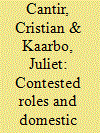

|
|
|
|
|
| Publication |
2012.
|
| Summary/Abstract |
Many of the strengths of research in Foreign Policy Analysis have been overlooked by role theorists. Role theorists often assume that roles are shared across elites and masses, that elites can manipulate masses, or that public opinion on roles constrains elites. Role theorists also tend to assume that there is a consensus among elites over national roles. Research in Foreign Policy Analysis, on the other hand, demonstrates that foreign policy may be contested both vertically (between elites and masses) and horizontally (among elites) and that these conflicts affect foreign policy decision making and foreign policy behavior. We propose that (i) contested roles mean that roles and foreign policy are not as stable as is often implied; (ii) research on contested roles offers Foreign Policy Analysis a less preference-oriented way of conceptualizing policy disagreements and decision making; and (iii) structures reveal themselves as important when agents use them in domestic discourse over contested roles, but the impact of international norm and role structures is not automatic, as it is shaped by the agents (and domestic structures) in the domestic political process. We suggest that research on the strategic use of roles could bring together these benefits of examining contested roles.
|
|
|
|
|
|
|
|
|
|
|
|
|
|
|
|
| 6 |
ID:
158992
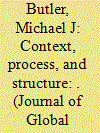

|
|
|
|
|
| Summary/Abstract |
When and in what circumstances do states turn to conflict management to manage a crisis? This article identifies a set of contextual, processual, and structural variables, examining the presence and strength of their associations with the likelihood of states employing conflict management in a foreign policy crisis. I conduct an empirical analysis of more than one thousand foreign policy crises between 1918 and 2013, using the International Crisis Behavior (ICB)-2 dataset, and with the data seek to craft a comprehensive model with the capacity to reliably predict when states will turn to conflict management in a foreign policy crisis based on the context and dynamics of a crisis as well as the attributes of crisis actors. My analysis suggests that states are more likely to employ negotiation, mediation, adjudication, and arbitration in foreign policy crises where the appeal, utility, and experience of violence is diminished; in crises involving weak, nascent, and/or transitional political entities; in crises involving fewer actors and/or crises not embedded within protracted conflicts; and in crises in which International Governmental Organizations (IGOs) are significantly involved.
|
|
|
|
|
|
|
|
|
|
|
|
|
|
|
|
| 7 |
ID:
145099
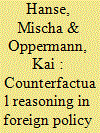

|
|
|
|
|
| Summary/Abstract |
The abstention of the conservative-liberal government under Chancellor Angela Merkel on UN Security Council resolution 1973 marked the first occasion in which the Federal Republic of Germany stood against all three of its main Western partners, the US, France, and the UK, simultaneously, on a major foreign policy issue. Many accounts of this decision invoke the influence of electoral incentives. What is problematic, however, is that the causal weight attached to electoral politics is often left ambiguous and difficult to assess with traditional case study methods. The article, therefore, employs counterfactual reasoning to scrutinize “electoral politics” explanations of Germany's policy on Libya. Specifically, it develops counterfactuals in which decision making did not take place in the shadow of upcoming elections and investigates how other variables on different levels of analysis would have shaped decision making in the counterfactual scenarios. The findings suggest that electoral incentives did not decisively shift German foreign policy on Libya. More generally, the article speaks to the value of counterfactuals in foreign policy analysis.
|
|
|
|
|
|
|
|
|
|
|
|
|
|
|
|
| 8 |
ID:
175658
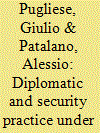

|
|
|
|
|
| Summary/Abstract |
In what ways are Japanese foreign and security policies changing? How far will these changes go? Will they result in a policy posture that breaks from the post-1945 approach as originally designed by Prime Minister Yoshida Shigeru? This special issue presents six articles that address these questions. They tackle the relationship between recent changes in Japanese domestic policy institutions and Japanese diplomatic and security practice. In this introduction, we outline the significance of the essays’ findings and propose a methodological shift in the interpretation of Japanese policy. We make the case that Japan’s approach to diplomatic and security affairs under Abe is evidence of the emergence of a ‘Realpolitik Japan’. From this perspective, we argue that values and political ideology have translated into practical choices that make the question of the ‘break with the post-1945’ approach less relevant to understand the significance of political change.
|
|
|
|
|
|
|
|
|
|
|
|
|
|
|
|
| 9 |
ID:
188472
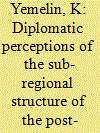

|
|
|
|
|
| Summary/Abstract |
IN CONTRAST to the rather clearly defined state borders, the division of the ecumene into regions and subregions is relative and highly speculative. It is implemented at the level of individuals and social groups, as well as states and political blocs. The classics of critical geopolitics, who insist on the socially conditioned basis of the perception of political and geographical space, argue that the drawing of boundaries may be both "conceptual and cartographic, imaginary and actual, social and aesthetic."
|
|
|
|
|
|
|
|
|
|
|
|
|
|
|
|
| 10 |
ID:
091919
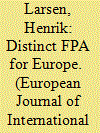

|
|
|
|
|
| Publication |
2009.
|
| Summary/Abstract |
In the existing literature, the need for a distinctive approach to the analysis of foreign policy in Europe is usually seen as a uniform requirement applying across policy areas. At the same time, the criteria for judging the need for a new approach are underspecified. The article puts forward the argument that the approach to analysis of the national foreign policies of EU member states ought to vary according to the policy area under study. On the basis of an empirical study of Danish foreign policy, the article presents a comprehensive framework for the analysis of national foreign policy in an EU context which takes account of differing issue areas. The framework includes three analytical lenses: traditional FPA, transformed FPA and postmodern FPA. These lenses are derived from the strength of the EU policy and the national understandings of agency in the area concerned
|
|
|
|
|
|
|
|
|
|
|
|
|
|
|
|
| 11 |
ID:
165299
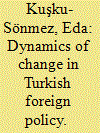

|
|
|
|
|
| Summary/Abstract |
This paper offers a contribution to the literature on Turkish foreign policy (TFP) change through quantitative analysis of Turkey’s foreign policy chronology under the ruling Justice and Development Party (Adalet ve Kalkınma Partisi, AKP) between January 2009 and October 2016. It utilizes an original dataset on foreign policy meetings which is then utilized to ascertain the alterations in their volume, direction and purpose. Through this analytical framework, the paper depicts the course of TFP orientations towards different countries and regions, as well as potential explanations of their dynamics. Among its many findings, the paper suggests that bilateral diplomatic activism in the late AKP period can be explained by motivating factors such as trade, geographical proximity and shared identity. Moreover, fluctuations in regional orientations of TFP can be associated with sudden and less calculated reactions to international or domestic political crisis situations.
|
|
|
|
|
|
|
|
|
|
|
|
|
|
|
|
| 12 |
ID:
108670
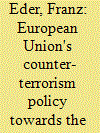

|
|
|
|
|
| Publication |
2011.
|
| Summary/Abstract |
This article sheds light on the European Union's counter-terrorism policy in the Maghreb taking into account the diverse influences and interests shaping its strategic thinking. To explain the complex web of opportunities and constraints, the article refers to Terry Deibel's framework for the analysis of foreign and security affairs. The author concludes that the Union's counter-terrorism policy in the Maghreb has been shaped more by the desire for regional stability and greater trade relations and energy security than by the goal of promoting democratic values and human rights. Moreover, the promotion of democracy is perceived by EU policy-makers as a destabilising factor that could endanger counter-terrorism efforts.
|
|
|
|
|
|
|
|
|
|
|
|
|
|
|
|
| 13 |
ID:
144767
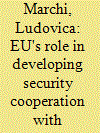

|
|
|
|
|
| Summary/Abstract |
This article tracks the European Union’s efforts at the Association of Southeast Asian Nations (ASEAN) Regional Forum (ARF), from 2004 to 2008, to encourage Myanmar directly or indirectly to engage in security cooperation. It, then, explores Myanmar and ASEAN's reactions to the devastation caused by Cyclone Nargis to Myanmar’s Irrawaddy delta in 2008. It focuses on ARF as a forum whereby interactions take place. It examines whether the complementary of the analytical variables provided by the logic of consequences and appropriateness [March, J.G. and Olsen, J.P., 1998. The institutional dynamics of international political orders. Oslo, Arena Working Paper No. 5; 2004. The logic of appropriateness. Oslo, Arena Working Paper No. 9], social mechanisms [Checkel, J., 1999. Social construction and integration. Journal of European public policy, 6 (4), 545–560.] and observations derived from interviews (Southeast Asia and Brussels) can explain ASEAN and Myanmar’s reactions and, also, the EU’s behaviour in relation to the Myanmar-Nargis event. The EU’s role is explored through the co-chair’s summary reports of the meetings that the EU co-chaired with ASEAN. The article uncovers the EU’s efforts to encourage ASEAN to take up responsibilities and Myanmar to accept multilateral security options. It argues that, as the EU tried to inspire Myanmar to connect with cooperation, “Myanmar hit by Cyclone Nargis” motivated the EU Council to include the "responsibility to protect" as a new goal of the European foreign and security policy of December 2008.
|
|
|
|
|
|
|
|
|
|
|
|
|
|
|
|
| 14 |
ID:
157851
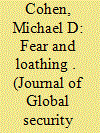

|
|
|
|
|
| Summary/Abstract |
Does nuclear weapon development embolden national leaders to engage in more assertive foreign policies? Despite the importance of this question to international security studies, the nuclear emboldenment hypothesis has received little attention. This article develops a theoretical explanation of emboldenment grounded in social psychology and uses translated archival sources and secondary studies to test it on the cases of Nikita Khrushchev and Mao Zedong. The results suggest that the dangers of nuclear emboldenment, while real, are substantially less than usually assumed. Biases associated with the availability heuristic cause leaders of new nuclear powers to authorize dangerous coercive policies in the short-term. However, the fear they experience at the nuclear brink causes them and their successors to authorize moderate policies in the longer-run. Findings achieved through case study analysis lead to the conclusion that nuclear proliferation is dangerous when leaders believe that nuclear coercion is safe, but becomes safe when they learn that nuclear coercion is dangerous.
|
|
|
|
|
|
|
|
|
|
|
|
|
|
|
|
| 15 |
ID:
145783
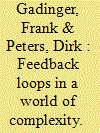

|
|
|
|
|
| Summary/Abstract |
Feedback in foreign policy occurs when a state's foreign policy affects the international context of that state and those changes in context subsequently impact on the state's future foreign policy decisions. In this way, feedback loops can develop, which may become self-reinforcing and in which foreign policy and international context continuously affect each other. Even though such processes are ubiquitous especially in a globalized world, they have hitherto received little systematic attention. We introduce cybernetics as a perspective that puts such feedback effects at the centre of attention and provides an accessible sequential framework for analysing them. Such a cybernetic analysis not only demonstrates the significance of feedback processes in foreign policies but also speaks to several recent debates in international relations theory and foreign policy analysis. In particular, it highlights processes of learning and change, of non-linearity and indeterminacy, and enables the researcher to integrate insights from structure- and agency-based approaches. We outline the merits of a cybernetic analysis by discussing the effects of feedback in the United States' War on Terror.
|
|
|
|
|
|
|
|
|
|
|
|
|
|
|
|
| 16 |
ID:
156789
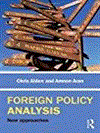

|
|
|
|
|
| Edition |
2nd ed.
|
| Publication |
Oxon, Routledge, 2017.
|
| Description |
ix, 186p.pbk
|
| Contents |
Includes bibliographical references and index.
|
| Standard Number |
9781138934290
|
|
|
|
|
|
|
|
|
|
|
|
Copies: C:1/I:0,R:0,Q:0
Circulation
| Accession# | Call# | Current Location | Status | Policy | Location |
| 059252 | 327.1/ALD 059252 | Main | On Shelf | General | |
|
|
|
|
| 17 |
ID:
170894
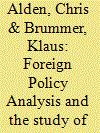

|
|
|
|
|
| Summary/Abstract |
This article proposes that the study of Indian foreign policy and Foreign Policy Analysis (FPA) offers a “win-win situation” for scholarship. On the one hand, this bridge-building exercise leads to a better understanding of the making and substance of Indian foreign policy. On the other hand, it advances FPA in both theoretical and empirical terms, thus contributing to overcoming FPA’s US/Western bias and to decentering the field more generally. Framing the argument in terms of levels of analysis, we offer specific contributions to the understanding of foreign policy in areas such as leadership traits, poliheuristic theory, coalition politics, and state-society influences. Moreover, this line of research suggests the contours of a new comparative foreign policy agenda which could emerge from this examination of Indian foreign policy.
|
|
|
|
|
|
|
|
|
|
|
|
|
|
|
|
| 18 |
ID:
141960
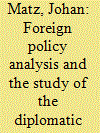

|
|
|
|
|
| Summary/Abstract |
In 1982, claims were made that the Swedish diplomat, Raoul Wallenberg, when preparing in mid-January 1945 for his trip to Soviet military headquarter in Debrecen, north of Budapest, concealed large amounts of valuables—gold and jewellery—in his car. Moreover, the argument exists that Russian discovery of these valuables had a significant impact on both Swedish and Soviet handling of his case. Recently re-surfacing in a biography of Wallenberg, this claim is incorrect. The testimonies referred to in its support are fraught with serious weaknesses and, the causal chain allegedly set off about finding the valuables is not verifiable. This analysis argues that the study of the diplomatic history of the Wallenberg case could benefit significantly by taking some basic insights from the field of foreign policy analysis into account.
|
|
|
|
|
|
|
|
|
|
|
|
|
|
|
|
| 19 |
ID:
175457
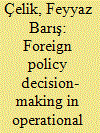

|
|
|
|
|
| Summary/Abstract |
Traditionally seen as an interlocutor between Europe and the US in transatlantic security relations, the UK’s engagement with the training of the Afghan National Police (ANP) through the concurrent EU and NATO missions presents an interesting case of foreign policy decision-making. Although a logic based on broader British orientations about the roles of the two organisations expect that the UK’s primary institution of choice would be NATO, London supported both missions in providing international policing assistance to Afghanistan. Adopting an operational overlap perspective, this article seeks to explain the UK’s strategic behaviour vis-a-vis the EU and NATO training missions that have been simultaneously involved in overlapping tasks, despite the initial intention that the two missions would undertake different and complementary roles. Analysing evidence from the UK Parliament and Government, US diplomatic missions, the EU and NATO, as well as interviews with former UK and NATO officials, this article argues that while providing training to the Afghan police, London focused on these missions’ practical outputs rather than preferring an organisation of choice as such. This strategy is mainly guided by the UK’s concern to uphold counter-narcotics enforcement in Afghanistan and to fulfil transition tasks during the incremental withdrawal of British troops.
|
|
|
|
|
|
|
|
|
|
|
|
|
|
|
|
| 20 |
ID:
184047
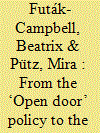

|
|
|
|
|
| Summary/Abstract |
This article explores Angela Merkel’s decision to open Germany’s borders to refugees in September 2015 and her support for the EU-Turkey statement in March 2016. While the first policy offered relief to refugees, the second was designed to significantly reduce the number of refugees coming to Europe. Besides the seemingly contradictory rationale behind these two foreign policy decisions, the role that domestic media played in Merkel’s decision to open the borders was remarkable. The connection between media reports and public opinion has long been established, whereas the connection between foreign policy and the media is more recent. However, the link between all three and how they operate together is yet to be studied. By exploring these connections, we show how foreign policy decisions can be accepted by locals within a language context that fosters identification with outsiders. Similarly, a shift in the discourse, which contributed to the perception of a divergence of interests between the local population and the refugees, helps to understand the subsequent change in foreign policy. In short, we show how this shift provides an insight into the parallels between domestic media discourses, public opinion and foreign policy decisions. We apply deductive qualitative content analysis to demonstrate this connection.
|
|
|
|
|
|
|
|
|
|
|
|
|
|
|
|
|
|
|
|
|